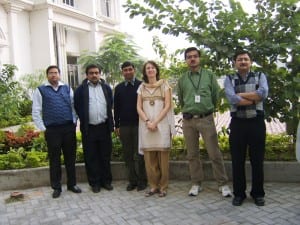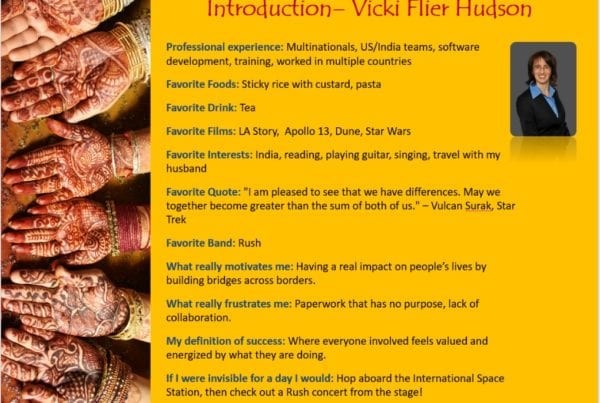 I want to clear up something right away. I love technology. I’m not one of those crotchety people that tells stories about how great life was before all these newfangled devices. I have this blog, a website, Facebook, Twitter, LinkedIn, an iPhone, and documents in the “cloud.”
I want to clear up something right away. I love technology. I’m not one of those crotchety people that tells stories about how great life was before all these newfangled devices. I have this blog, a website, Facebook, Twitter, LinkedIn, an iPhone, and documents in the “cloud.”
I would also be hard pressed to deny the positive influence that technology and the virtual world have had on recent events and on business. Think of Egypt and the role the Internet played in their eighteen day revolution. Think of CEO’s making critical decisions sitting in Cisco Telepresence meeting rooms with life-sized images of each participant. I even think of my own ability share culture by taking videos on my iPhone in India and sharing them with my clients.
Regardless of how we feel about technology, in the words of a Zen master, it is what is. The generations below me will only know the pervasiveness of technology and when they enter the workforce they will likely be part of multiple global virtual teams.
We know what we have gained from all of this virtuality: The ability to meet without traveling, to work across time zones, and to benefit from the diversity of thought.
My question is what have we lost?
This past January in India I had the honor of talking to a Professor from a University in Vadodara. Wisdom seemed to ooze from every pore of his being, and quotes from every word out of his mouth. I asked him about India’s growth and development, wondering about the impact on the country’s culture and values. While we had a long discussion on the subject, his initial answer stuck with me.
He said “Nothing is lost.”
When I think of the virtual world I can’t help wondering if this is true. I conduct virtual training on a regular basis, everything from complex half-day courses with web-based breakout rooms to a simple broadcast presentation over the phone. While I enjoy these engagements, I have never been able to agree with those who say that virtual work is fast approaching the feel and effectiveness of face-to-face. For me something is missing and I set about trying to find out what. The answer, as usual for me, came from Asia.
At a recent conference in India I sat next to a student from a nearby university. As we talked we got on the subject of virtual training and I told her my feeling that something is missing, but that I couldn’t figure out what it was. She looked reflective.
 “I might have an idea,” she said. “As a Hindu I believe that every person has energy that emanates from them, energy that is physical, that can be felt and moved. It’s like an aura, you could say. When you work virtually no matter how good the technology is, the aura is missing.”
“I might have an idea,” she said. “As a Hindu I believe that every person has energy that emanates from them, energy that is physical, that can be felt and moved. It’s like an aura, you could say. When you work virtually no matter how good the technology is, the aura is missing.”
That was the best explanation I had ever heard. It reminded me of how my good friend and colleague Peter, a program manager at Cisco and a Vietnamese native, told me he was going to send his positive qi (pronounced chee) my way for a successful presentation. Simply put, qi is energy, a vital part of trust and effectiveness.
We cannot deny the losses we experience when we do virtual work. To do so in my opinion would be counterproductive. But the virtual world can be liberating. As my colleague from Britain put it, “I’ve been able to work with my friend Bob for fifteen years because we don’t have to work in the same office!”
How do we manage the loss and maximize the benefits of technology? Here are my contributions:
- Don’t lose the ability to give someone your undivided attention. Yes, we have the opportunity to be in the virtual world almost every second of every day, but that doesn’t mean we must always choose that path. Try participating in one conference call where you actively listen and do not multitask at all.
- For at least a part of the day, try doing one thing at a time. Shut down your e-mail and focus on engaging your creativity. To block distracting websites, try this application: https://addons.mozilla.org/en-US/firefox/addon/leechblock/
- Make intentional, scheduled efforts to connect with people virtually on a personal level. For example, about once a month or more I go through my Skype contacts and see who I haven’t talked to in awhile. If they are online I ping them and say hello, just to catch up.
- Use Skype video for every first-time virtual meeting. If you have a new client or colleague and you will not have the chance to meet in person right away, plug in your video camera and see each other’s faces.
- Budget in time and resources for face-to-face meetings, especially for new teams. You can establish a highly effective virtual team, but remember that the qi will be missing. Meeting face-to-face early on can solidify trust and fill up the bank account for future interactions.
What do you do to manage virtual loss? How do you use technology to connect? I look forward to your comments.




